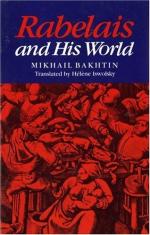
|
| Name: _________________________ | Period: ___________________ |
This quiz consists of 5 multiple choice and 5 short answer questions through Chapter 4, Chapter 2 - The Language of the Marketplace.
Multiple Choice Questions
1. What is "man's second nature," according to Renaissance Christian doctrine?
(a) The celebratory but degrading impulse toward gluttony, scatology, and sex.
(b) Man's higher spiritual calling.
(c) The way people act differently around those of another social class.
(d) The thoughtfulness of the individual mind.
2. What do oaths and curses have in common with town announcements and the calls of vendors?
(a) They are all said with the same feelings in mind.
(b) They all are forbidden during certain times of the year.
(c) They are the only socially acceptable methods of greeting strangers.
(d) They all are familiar parts of the society of the marketplace.
3. How did Rabelais obtain the material for his writings?
(a) By interviewing thousands of market vendors.
(b) By receiving a divine revelation.
(c) By attending many fairs and festivals and observing all the people there.
(d) By studying manuscripts for long hours in monasteries.
4. During the "feast of fools" and the "feast of the ass," laughter:
(a) Was forbidden because of the sacredness of the festival.
(b) Was forbidden everywhere but the marketplace.
(c) Was encouraged even in church.
(d) Was regulated by the town fools and farmers.
5. Bakhtin thinks that life is:
(a) Organized by human acts of behavior and cognition.
(b) A sacrifice the soul makes to the body.
(c) Inert, chaotic, and requiring the intervention of art.
(d) Meaningless and futile.
Short Answer Questions
1. According to Bakhtin's semiotic understanding, what irony is inherent within the creative power of language?
2. With what is "folk culture" most concerned?
3. What does Bakhtin find to be the greatest error other critics make in their studies of Rabelais' works?
4. What does Bakhtin argue is the role of dialogue?
5. What do Rabelais' various works indicate about the popular notion of urination?
|
This section contains 410 words (approx. 2 pages at 300 words per page) |

|




